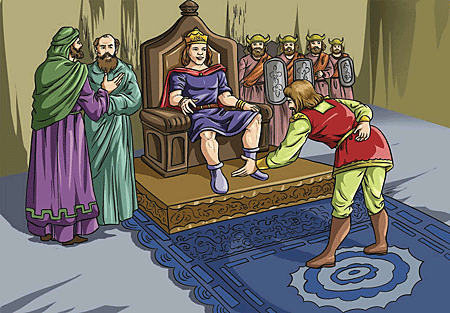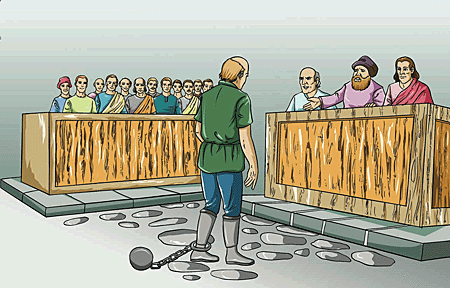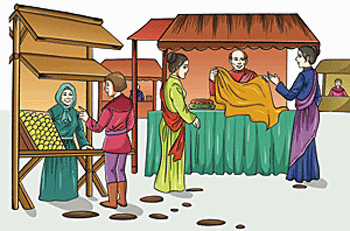English and Its Historical Development, Part 16
(period of greatest Danish influence)
A.D. 1016-1035 was the period of the greatest Danish influence during the reign of King Canute (Cnute); King of England and Scandinavia

The Danish king Canute, or Cnut, took over the whole country after a further series of Viking invasions
The shape of England , as we know it, began to emerge when Canute took control of Britain.
As of the tenth century, England was divided into "shires", units of unequal size later to be called counties; each of these had a court which met twice a year and was presided over by the king's representative, the shire-rieve, now "sheriff".
The shires in turn were divided into hundreds (or in the Danes' lands, wapentakes), again unequal in size and each with its own court; this was the court most used by the rural population, who lived in villages.
Was Canute really a great king?
Canute is generally regarded as a wise and successful king of England, although this view may in part be attributed to his good treatment of the Church, which controlled the historic records.
He nevertheless brought England more than two decades of peace and prosperity. The medieval church loved order, supporting good and efficient sovereignty whenever the circumstances allowed it; so, we see him described even today as a religious man, despite the fact that he lived openly in what was effectively a bigamous relationship, and despite his apparent responsibility for several political murders.
The Scandinavian Settlements
From the middle of the ninth century, large numbers of Norse invaders settled in Britain, particularly in northern and eastern areas, and in the eleventh century the whole of England had a Danish king, Canute.
The distinct North Germanic speech of the Norsemen had a great influence on English, which is most obviously seen in the words that English has borrowed from this source.
Such borrowed words include some very basic examples; such as, "take" and even grammatical words; such as, "they".
The common Germanic base of the two languages meant that there were still many similarities between Old English and the language of the invaders.
Some words, for example "give" perhaps show a kind of hybridization with some spellings going back to Old English and others being Norse in origin.
The similarities between the two languages are so great that in many cases it is impossible to be sure of the exact ancestry of a particular word or spelling; however, much of the influence of Norse, including the vast majority of the loanwords, does not appear in written English until after the next great historical and cultural upheaval, the Norman Conquest.
The Vikings left their system of legal procedures in England

Danish, like Saxon kings, thought of themselves as unifiers and as lawgivers, and Canute's "dooms" or laws are considered to be the most advanced in Europe at that time.
Canute is said to have had great respect for the old English laws, to which he brought a keen sense of justice and a regard for individual rights; however, it is said that Canute's laws merely repeated those enacted by his predecessors, including Ethelred II, and when they took any action with religious or ecclesiastical subjects, they frequently echoed the homiletic style of Archbishop Wulfstan.
Canute is said to have shown himself a defender of the rights of the Church and he did penance for the wrongdoings of his Viking forefathers, built churches, and made many generous gifts to others.
One of the laws, among many, was an agreement reached between the English and the Danes at Oxford in 1018 which decided: "that above all other things they would ever honour one God and steadfastly hold one Christian faith."
His laws included statutes against heathen practices and during the rest of the Anglo-Saxon period, most sees were occupied by men of learning and integrity and so it is believed that the English Church was neither decadent nor corrupt when the Normans came later.
Canute "strengthened his position in England" by marriage with Emma of Normandy, the widow of Æthelred, who was Canute's former opposition in England

None of Canute's children produced any heirs and it was one of Emma's sons by Æthelred, Edward (later known as "the Confessor"), who returned from Normandy to ascend to the English throne in 1042.
The Vikings continued to use the Anglo-Saxon system of measures

The man on the left side is speaking with the woman, "One measure-full of peas, please."
On the right, the salesman is saying, "Two arm stretches + 5 spans = 2.5 armstretches." The woman responds, "All right, give me five more spans so I can have three armstretches."
Proceed to Part 17, Edward the Confessor.
INDEX or Table of Contents, English and its historical development.
References: sources of information.
